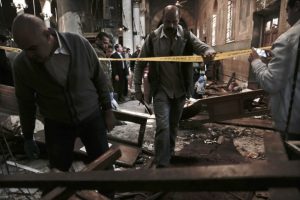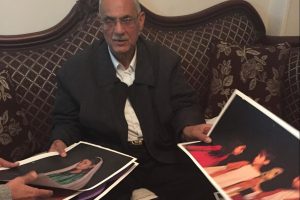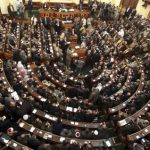By Sudarsan Raghavan and Heba Mahfouz – The Washington Post –
The couple didn’t buy a Christmas tree. Nor did they place any festive balloons and ornaments inside their modest apartment, as they’ve done for decades. On Friday night, when they and other Orthodox Coptic Christians celebrated Christmas Eve, they attended a somber service at a local church.
It was not at the church where their 10-year-old granddaughter, Maggie, died in a suicide bombing last month.
“There is no Christmas for us,” said Samir Abdo, his eyes welling up with tears, as his wife sat next to him, visibly anguished. “The moment Maggie was taken to the hospital, the clock just stopped.”
This weekend, millions of Coptic Christians across Egypt are celebrating Christmas, attending Christmas Eve Mass on Friday and joining gatherings of friends and family. But last month’s attack on St. Mark’s Coptic Orthodox Cathedral complex in Cairo that killed more than two dozen worshipers, as well as stoked fears for the future, cast a shadow over the Christian community during what is normally its most festive season.
At services across the nation, amid tightened security, the focus was on prayers for the victims — and their attackers.
“I will tell the people at my church to pray for those who attack them,” Bishop Makarios, the head of the Coptic diocese in Minya province, south of Cairo, said in an interview last week. “To love thy enemies, to forgive, and to pray to God to extract evil and darkness from their hearts, not just for the sake of Christians, but all of Egypt.”
The Dec. 11 attack inside the 100-year-old Botrosiya Church, also known as the Church of St. Peter and St. Paul, initially killed 25 people and injured 49. It was the deadliest attack on Egypt’s Christian minority in recent years.
The Islamic State claimed responsibility, saying it had dispatched a suicide bomber during Sunday Mass at the church, located inside St. Mark’s Coptic Orthodox Cathedral complex, the seat of the Coptic papacy. The group vowed to stage more attacks against Christians.
By last week, the death toll had risen to 28, church officials said. Many victims remain hospitalized struggling to overcome serious injuries. Egypt’s Interior Ministry said last week that police had arrested four suspects in connection to the bombing.
Egypt’s Christians make up 10 percent of the country’s 94 million people and are the largest Christian community in the Middle East. Under the Coptic calendar, the birth of Jesus Christ falls on Jan. 7, when Christmas is also celebrated in Eastern Orthodox nations such as Russia.
For decades, Egypt’s Christians have felt besieged by successive regimes that have restricted their ability to practice their religion. Attacks against the community have risen since the Arab Spring revolutions that ousted President Hosni Mubarak nearly six years ago.
The assaults have added pressure on President Abdel Fatah al-Sissi, whose rise many Christians supported in the hope that his government would protect their community.
“We received a lot of threats after the bombing, at different churches all over Egypt,” said Makarios. “But the security apparatus is following up, investigating, and tightening security measures.”
On Saturday, Abdo and his wife, Kamelya Naseem, greeted well-wishers at their apartment who had come to comfort and console them. Later, they went to their daughter’s home — Maggie’s mother — which was filled with friends, neighbors, and strangers who had come to support the family.
“The priest told us that we should not fear, and that life in heaven is better and more rewarding than life on earth,” said Samir, referring to the Christmas Eve service.
In an interview at their apartment last week, he recalled how Maggie Moamen Magdy’s life was rewarding in so many ways. She was the youngest victim of the attacks, and yet her short life was filled with accomplishments. She was the captain of the school’s volleyball team and had performed in five school plays, including one at Cairo’s Opera House, her grandfather said.
The week before the bombing, Maggie had played the role of Moses’s sister in a school play.
She had been seriously injured in the blast, bleeding internally. She spent 10 days on a life support machine.
“When I took her for an X-ray, I couldn’t look at her,” Abdo said. “How could one so vibrant and so animated lie on the bed so motionless?”
At her funeral, her distraught mother asked everyone to wear white, because black would have made her more depressed.
On Saturday, Qelliny Farag spent Christmas Day at the hospital, seated by the bed of his wife, Samira.
Her face was partially bandaged, covering the right side. Her jaw was broken, and she was blind in her right eye. She had difficulty breathing.
Samira has been at the hospital since the bombing and has gone through two operations, and is facing a third. And if that’s successful, she’s scheduled to receive more treatment in Germany.
On the day of the bombing, Farag was also in the church. He spent hours looking for his wife, finding her in the intensive care unit. Since then, he’s spent every day with her, from 7 a.m. to 7 p.m.
“I cannot leave her,” he said in an interview last week. “All my life she’s been kind and good to me, comforting me, even when I’ve done wrong.”
He, too, didn’t buy a Christmas tree this year.
“Who would I buy it for?” Farag said. “I will be with her in the hospital. That will be our Christmas.”
Like most Christians, he’s concerned about the future. He expects more attacks against the community. But also said he has no plans to leave his home, even if he had the opportunity. He noted recent terrorist attacks in Turkey, Germany and France.
“It will just keep happening anywhere,” Farag said. “The Islamic State blasts churches, mosques, night clubs. Where can we go?”
What he and other Christians hope for is that the barricades and increased security personnel at churches not get removed — as the government has done in the past following other attacks on Christians.
“The most important thing is that these measures don’t last only for a couple of months,” Naseem, Abdo’s wife, said.
As her husband spoke about his granddaughter, how she wanted to become a famous actress or a professor like her mother, he broke down, crying uncontrollably. So did his wife.
In front of them, were dozens of blown-up photos of Maggie — in the school play, in a pretty dress, at a volleyball practice. There were also newspaper clippings, as virtually every media outlet in the country covered her life. In death, Maggie had become famous.
“What was her fault? What was her sin?” Abdo said. “Why would this happen to a 10-year-old?”
____________________
https://www.washingtonpost.com/world/middle_east/with-bombing-victims-still-dying-its-a-somber-christmas-for-egypts-christians/2017/01/07/95d27a9c-d162-11e6-9651-54a0154cf5b3_story.html?utm_term=.c2f4059fe731
Photo: Samir Abdo looks at photos of his 10-year-old granddaughter, Maggie Moamen Magdy, who was killed in the suicide attack in Cairo last month. Maggie was the youngest victim to die in the attack. (Sudarsan Raghavan/The Washington Post)






